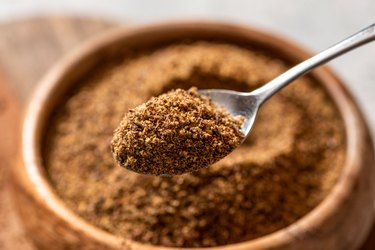
Flax seeds may be small, but big claims have been made about their health benefits for people assigned male at birth. The biggest: Prostate cancer prevention. Evidence shows there may be a link between flax and prostate health, but more research is needed. Flax packs lots of other benefits, though.
Read more: Flax Seeds: How Much Per Day?
Video of the Day
Video of the Day
Flax Seeds and Prostate Cancer
Flax seeds, which are seeds from the flax plant, are a source of fiber, vitamins, minerals, protein, omega-3 fatty acids and antioxidants. The seeds have been shown to lower cholesterol levels, and ongoing research is looking into their potential to improve blood sugar and heart health, according to the U.S. National Library of Medicine (NLM).
They also contain plant chemicals called lignans, which is what makes flax useful for prostate health.
"The digestion of lignans — [or] phytoestrogens — produces a byproduct called enterolactone, which has been associated with a reduced risk of prostate cancer," says Isa Kujawski, MPH, RDN, a registered dietitian nutritionist based in Washington, DC.
"Studies suggest that enterolactone resulting from flaxseed supplementation can also reduce tumor growth in [people] who already have prostate cancer," she says.
In addition, the lignans in flax seeds have been shown to reduce testosterone levels, which is another reason they might be beneficial for prostate cancer prevention, Kujawski says.
However, more research needs to be done on the flax seed and prostate cancer link. The evidence isn't definitive, according to the Academy of Nutrition and Dietetics. One barrier is that people in Western countries like America and Europe don't eat enough foods high in lignans, or other phytoestrogens, to make a relationship with prostate cancer easy to study.
How to Eat Flax Seeds
If you want to try it, Kujawski recommends getting around 4 tablespoons of ground flax seed daily.
Trying mixing ground flax seed into the foods you already eat, the NLM suggests, like:
- Pancakes or other baking mixes
- Smoothies
- Yogurt
- Cereal
- Salads
- Soups
- Pasta dishes
"Whole flax seeds have a tough hull exterior, which make them difficult to digest, so it's best to grind them in a coffee grinder before consuming," Kujawski says. If you choose to buy pre-ground flax seeds, they keep best when frozen or refrigerated in a tightly sealed container, she says.
Though whole ground flax seeds are a healthy choice, the Academy of Nutrition and Dietetics warns against people with prostate cancer using flaxseed oil because some studies have found the alpha linolenic acid (ALA) in this oil may actually make prostate tumors grow faster.
How can it be that the seeds from flax might be good for the prostate, but the oil from the seeds isn't? Possibly because flaxseed oil doesn't contain the lignans that have been associated with reduced cancer risk, according to the Academy of Nutrition and Dietetics.
Other Healthy Prostate Tips
Look beyond flax seeds to an overall nutritious diet to help manage prostate cancer risk, according to Harvard Medical School. This means eating lots of colorful fruit and vegetables, swapping processed carbs for whole grains and limiting sugar, salt and red meat. Cutting back on dairy may be a good idea, too; people who eat a lot of dairy products may be slightly more at risk for prostate cancer, according to the American Cancer Society.
Aim to eat more mushrooms, though: They might offer benefits for prostate cancer prevention, according to a September 2019 study in the International Journal of Cancer. The researchers found that regular mushroom-eaters were less likely to get prostate cancer, compared with those who ate them less than once a week.
Keeping an eye on your weight is also important, per the American Cancer Society. Some studies have found that people with obesity have a higher risk of a faster-growing prostate cancer.
Cardio exercise, such as brisk walking, running or biking, is another healthy habit vital for general prostate health, according to Harvard Medical School. Evidence suggests that people who are more physically active are less likely to suffer from benign prostatic hyperplasia (enlargement of the prostate that causes frequent urination) or chronic prostatitis (inflamed prostate).
- U.S. National Library of Medicine: “Healthy Food Trends -- Flaxseeds”
- Isa Kujawski, MPH, RDN, registered dietitian nutritionist, integrative health coach, Washington, DC
- Academy of Nutrition and Dietetics: “Flax Seed and Prostate Cancer Risk”
- Harvard Medical School: “10 Diet & Exercise Tips for Prostate Health”
- American Cancer Society: “Prostate Cancer Risk Factors”
- International Journal of Cancer: “Mushroom Consumption and Incident Risk of Prostate Cancer in Japan: A Pooled Analysis of the Miyagi Cohort Study and the Ohsaki Cohort Study”
Is this an emergency? If you are experiencing serious medical symptoms, please see the National Library of Medicine’s list of signs you need emergency medical attention or call 911.